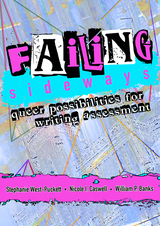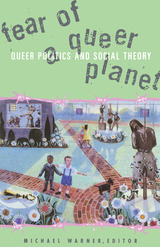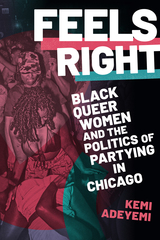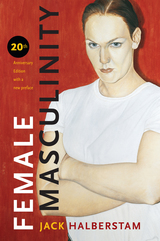108 books about Queer theory and 5
start with F
108 books about Queer theory and 5
108 books about Queer theory
5 start with F start with F
5 start with F start with F

Failing Sideways
Queer Possibilities for Writing Assessment
Stephanie West-Puckett
Utah State University Press, 2023
Failing Sideways is an innovative and fresh approach to assessment that intersects writing studies, educational measurement, and queer rhetorics. While valuing and representing the research, theory, and practice of assessment, authors Stephanie West-Puckett, Nicole I. Caswell, and William P. Banks demonstrate the ways that students, teachers, and other interested parties can find joy and justice in the work of assessment.
A failure-oriented assessment model unsettles some of the most common practices, like rubrics and portfolios, and challenges many deeply held assumptions about validity and reliability in order to ask what could happen if assessment was oriented toward possibility and potential. Working to engage a more capacious writing construct, the authors propose queer validity inquiry (QVI) as a model for assessment that values failure, affect, identity, and materiality. These overlapping lenses help teachers honor parts of writing and learning that writing studies faculty have struggled to hold onto in a world overly focused on quickness and efficiency in schools.
Through programmatic and classroom examples, Failing Sideways privileges what is valued in the classroom but traditionally ignored in assessments. Reimagining what matters in the teaching and learning of writing and using assessment data differently, this book demonstrates what writing can be and could do in a more diverse and just world.
A failure-oriented assessment model unsettles some of the most common practices, like rubrics and portfolios, and challenges many deeply held assumptions about validity and reliability in order to ask what could happen if assessment was oriented toward possibility and potential. Working to engage a more capacious writing construct, the authors propose queer validity inquiry (QVI) as a model for assessment that values failure, affect, identity, and materiality. These overlapping lenses help teachers honor parts of writing and learning that writing studies faculty have struggled to hold onto in a world overly focused on quickness and efficiency in schools.
Through programmatic and classroom examples, Failing Sideways privileges what is valued in the classroom but traditionally ignored in assessments. Reimagining what matters in the teaching and learning of writing and using assessment data differently, this book demonstrates what writing can be and could do in a more diverse and just world.
[more]

Fear Of A Queer Planet
Queer Politics and Social Theory
Michael Warner
University of Minnesota Press, 1993

Feels Right
Black Queer Women and the Politics of Partying in Chicago
Kemi Adeyemi
Duke University Press, 2022
In Feels Right Kemi Adeyemi presents an ethnography of how black queer women in Chicago use dance to assert their physical and affective rights to the city. Adeyemi stages the book in queer dance parties in gentrifying neighborhoods, where good feelings are good business. But feeling good is elusive for black queer women whose nightlives are undercut by white people, heterosexuality, neoliberal capitalism, burnout, and other buzzkills. Adeyemi documents how black queer women respond to these conditions: how they destroy DJ booths, argue with one another, dance slowly, and stop partying altogether. Their practices complicate our expectations that life at night, on the queer dance floor, or among black queer community simply feels good. Adeyemi’s framework of “feeling right” instead offers a closer, kinesthetic look at how black queer women adroitly manage feeling itself as a complex right they should be afforded in cities that violently structure their movements and energies. What emerges in Feels Right is a sensorial portrait of the critical, black queer geographies and collectivities that emerge in social dance settings and in the broader neoliberal city.
Duke University Press Scholars of Color First Book Award recipient
Duke University Press Scholars of Color First Book Award recipient
[more]

Female Masculinity
Jack Halberstam
Duke University Press, 1998
In this quintessential work of queer theory, Jack Halberstam takes aim at the protected status of male masculinity and shows that female masculinity has offered a distinct alternative to it for well over two centuries. Demonstrating how female masculinity is not some bad imitation of virility, but a lively and dramatic staging of hybrid and minority genders, Halberstam catalogs the diversity of gender expressions among masculine women from nineteenth-century pre-lesbian practices to contemporary drag king performances.
Through detailed textual readings as well as empirical research, Halberstam uncovers a hidden history of female masculinities while arguing for a more nuanced understanding of gender categories that would incorporate rather than pathologize them. He rereads Anne Lister's diaries and Radclyffe Hall's The Well of Loneliness as foundational assertions of female masculine identity; considers the enigma of the stone butch and the politics surrounding butch/femme roles within lesbian communities; and explores issues of transsexuality among “transgender dykes”—lesbians who pass as men—and female-to-male transsexuals who may find the label of “lesbian” a temporary refuge. Halberstam also tackles such topics as women and boxing, butches in Hollywood and independent cinema, and the phenomenon of male impersonators.
Featuring a new preface by the author, this twentieth anniversary edition of Female Masculinity remains as insightful, timely, and necessary as ever.
Through detailed textual readings as well as empirical research, Halberstam uncovers a hidden history of female masculinities while arguing for a more nuanced understanding of gender categories that would incorporate rather than pathologize them. He rereads Anne Lister's diaries and Radclyffe Hall's The Well of Loneliness as foundational assertions of female masculine identity; considers the enigma of the stone butch and the politics surrounding butch/femme roles within lesbian communities; and explores issues of transsexuality among “transgender dykes”—lesbians who pass as men—and female-to-male transsexuals who may find the label of “lesbian” a temporary refuge. Halberstam also tackles such topics as women and boxing, butches in Hollywood and independent cinema, and the phenomenon of male impersonators.
Featuring a new preface by the author, this twentieth anniversary edition of Female Masculinity remains as insightful, timely, and necessary as ever.
[more]

Feminism against Cisness
Emma Heaney
Duke University Press, 2024
The contributors to Feminism against Cisness showcase the future of feminist historical, theoretical, and political thought freed from the conceptual strictures of cisness: the fallacy that assigned sex determines sexed experience. The essays demonstrate that this fallacy hinges on the enforcement of white and bourgeois standards of gender comportment that naturalize brutalizing race and class hierarchies. It is, therefore, no accident that the social processes making cisness compulsory are also implicated in anti-Blackness, misogyny, Indigenous erasure, xenophobia, and bourgeois antipathy for working-class life. Working from trans historical archives and materialist trans feminist theories, this volume demonstrates the violent work that cis ideology has done and thinks toward a future for feminism beyond this ideology's counterrevolutionary pull.
Contributors. Cameron Awkward-Rich, Marquis Bey, Kay Gabriel, Jules Gill-Peterson, Emma Heaney, Margaux L. Kristjansson, Greta LaFleur, Grace Lavery, Durba Mitra, Beans Velocci, Joanna Wuest
Contributors. Cameron Awkward-Rich, Marquis Bey, Kay Gabriel, Jules Gill-Peterson, Emma Heaney, Margaux L. Kristjansson, Greta LaFleur, Grace Lavery, Durba Mitra, Beans Velocci, Joanna Wuest
[more]
READERS
Browse our collection.
PUBLISHERS
See BiblioVault's publisher services.
STUDENT SERVICES
Files for college accessibility offices.
UChicago Accessibility Resources
home | accessibility | search | about | contact us
BiblioVault ® 2001 - 2024
The University of Chicago Press









